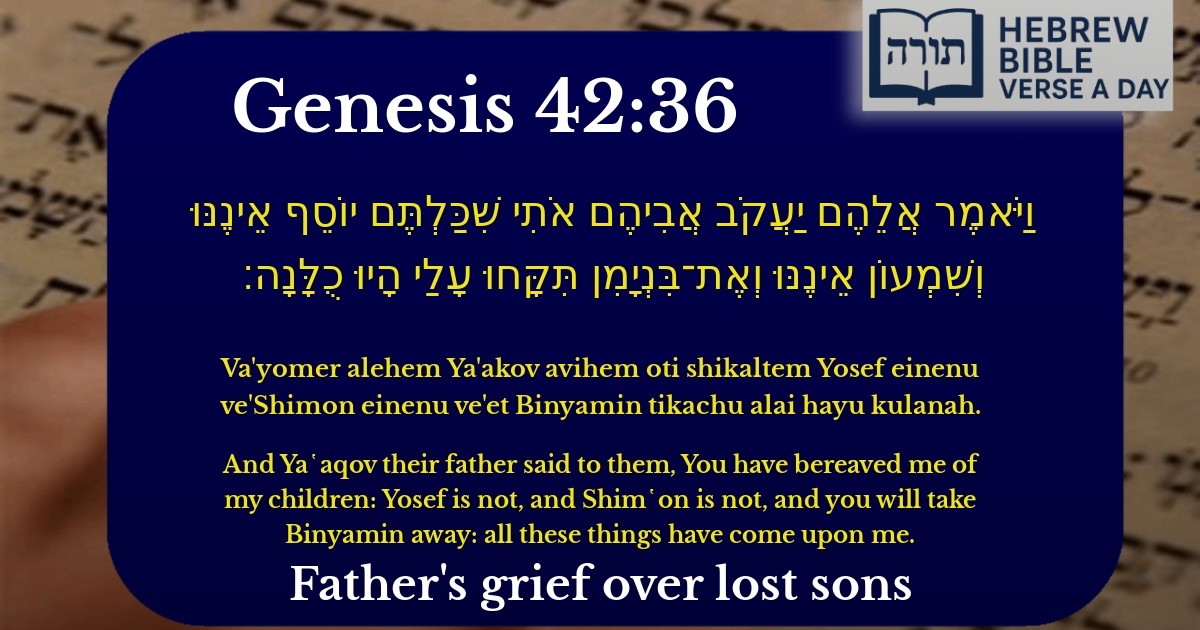Join Our Newsletter To Be Informed When New Videos Are Posted
Join the thousands of fellow Studends who rely on our videos to learn how to read the bible in Hebrew for free!
Hebrew Text
וַיֹּאמֶר אֲלֵהֶם יַעֲקֹב אֲבִיהֶם אֹתִי שִׁכַּלְתֶּם יוֹסֵף אֵינֶנּוּ וְשִׁמְעוֹן אֵינֶנּוּ וְאֶת־בִּנְיָמִן תִּקָּחוּ עָלַי הָיוּ כֻלָּנָה׃
English Translation
And Ya῾aqov their father said to them, You have bereaved me of my children: Yosef is not, and Shim῾on is not, and you will take Binyamin away: all these things have come upon me.
Transliteration
Va'yomer alehem Ya'akov avihem oti shikaltem Yosef einenu ve'Shimon einenu ve'et Binyamin tikachu alai hayu kulanah.
Hebrew Leining Text
וַיֹּ֤אמֶר אֲלֵהֶם֙ יַעֲקֹ֣ב אֲבִיהֶ֔ם אֹתִ֖י שִׁכַּלְתֶּ֑ם יוֹסֵ֤ף אֵינֶ֙נּוּ֙ וְשִׁמְע֣וֹן אֵינֶ֔נּוּ וְאֶת־בִּנְיָמִ֣ן תִּקָּ֔חוּ עָלַ֖י הָי֥וּ כֻלָּֽנָה׃
וַיֹּ֤אמֶר אֲלֵהֶם֙ יַעֲקֹ֣ב אֲבִיהֶ֔ם אֹתִ֖י שִׁכַּלְתֶּ֑ם יוֹסֵ֤ף אֵינֶ֙נּוּ֙ וְשִׁמְע֣וֹן אֵינֶ֔נּוּ וְאֶת־בִּנְיָמִ֣ן תִּקָּ֔חוּ עָלַ֖י הָי֥וּ כֻלָּֽנָה׃
🎵 Listen to leining
Parasha Commentary
📚 Talmud Citations
This verse is quoted in the Talmud.
📖 Chullin 92a
The verse is referenced in a discussion about the suffering of Jacob and the loss of his sons, illustrating the depth of his grief.


Yaakov's Grief and Distress
The verse (Bereishit 42:36) captures Yaakov Avinu's profound anguish upon hearing his sons' request to take Binyamin down to Egypt. Rashi explains that Yaakov's words, "You have bereaved me of my children", reflect his belief that Yosef had been torn apart by a wild animal (as his sons had led him to believe) and that Shimon was now being held captive in Egypt. His fear of losing Binyamin as well compounded his sorrow.
The Threefold Loss
Yaakov mentions three losses in this verse, which the Midrash (Bereishit Rabbah 91:8) connects to the three cardinal sins that a Jew must avoid even at the cost of life:
Yaakov's Misinterpretation
The Kli Yakar notes that Yaakov's statement "all these things have come upon me" reflects his belief that these tragedies were punishments for his own sins. However, the Midrash suggests that this was actually part of Hashem's divine plan to reunite the family and bring them down to Egypt, fulfilling the prophecy given to Avraham at the Covenant Between the Parts (Bereishit 15:13).
The Missing Comfort
Rabbeinu Bachya observes that Yaakov, as a prophet, should have been comforted by the knowledge that Yosef was alive (as hinted in the numerical value of the words in his earlier dream). His failure to realize this shows how even great tzaddikim can have their prophetic vision clouded by overwhelming grief.